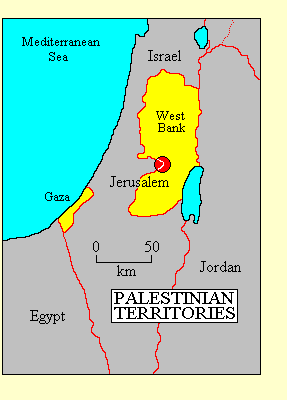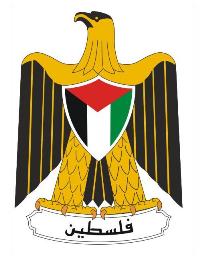

PALESTINIAN TERRITORIES
• Official name: The Palestinian Territories are those parts of the former League of Nations Mandated Territory of
Palestine which have not been incorporated into Israel. There is no state called Palestine, although the expression
"Palestine" is commonly used and has become semi-official since the Oslo Accords of 1995.
• Location: West Asia
• International organisations: Arab League, Non-Aligned Movement, Organisation of Islamic Conference
• Borders: Egypt, Israel, Jordan
• Coastline: Mediterranean Sea
• Land area: 6,220 Km2 (West Bank 5,860 Km2, Gaza 360 Km2).
• Population: 3,500,000 (West Bank 2,300,000, Gaza 1,300,000). (These figures are disputed by independent
demographers, who believe they are over-estimates.) This population includes
500,000 Jewish settlers.
• Annual GDP (PPP) per capita: US$2,900 (2009 CIA estimate). World ranking: equal 135
• Ethnicity: Palestinian Arab 86%, Israeli/Jewish 14%.
• Languages: Arabic is the official language of the Palestinian authority, and is
the first language of the Arab population. Most of the Jewish settlers speak Hebrew.
• Religion: Sunni Moslem 81%, Jewish 14%, Christian of various denominations 5%.
• Form of government: Under the terms of
the 1993 Israel-PLO Declaration of Principles on Interim Self-Government Arrangements,
a Palestinian Authority was created to administer the Palestinian Territories. The Palestinian Territories are divided
into 16 governorates. Most of the West Bank is still under Israeli occupation. Israel has formally annexed East
Jerusalem, but no other state has recognised this.

• Capital: The Palestinians regard Jerusalem (al-Quds al-Sharif in Arabic) as the capital of
Palestine. The administrative headquarters of the Palestinian Authority is in Ramallah.
• Constitution: The Constitution of
Palestine was approved in 2003 but its legal status is unclear.
• Head of state: Since there is no Palestian state there is no Palestinian head of state. The
position of President of the Palestinian Authority is intended to be a precursor to
such a position. Yasir Arafat was elected to this position in 1996, supposedly for
a four-year term, but no further elections were held until his death in 2004, when
Mahmoud Abbas was
elected to replace him. His term expired in 2010 and he now exercises the role without any legal basis.
• Head of government: The Prime Minister, appointed by the President of the
Palestinian Authority. This position was created in March 2003.
• Legislature: The Palestinian Authority has a unicameral legislature, the
Legislative Council, which has 172 members. The Council was last elected
in 2005 and its term has now expired.
• Electoral authority: The Central
Election Commission administers elections.
• Freedom House 2009 rating: Political Rights 5, Civil Liberties 6
Political history
After the Arab defeat in 1948 and the establishment of Israel, a Palestinian government in exile was
established in Gaza, but ceased to function when the West Bank and Gaza were occupied by Israel during the 1967 war. It was
succeeded by the Palestine Liberation Organisation (PLO), led from 1969 by Yasir Arafat. The PLO waged an intermittent
guerilla war against Israel, and also a terrorist campaign against American and Jewish targets around the world. A series of
peace plans have failed on the related issues of Jewish settlers, Palestinian refugees and the future of Jerusalem,
claimed by the both Israelis and Palestinians as their capital.
Following the Oslo Accords of 1995, the Israelis handed over administration of most of the Territories to a
quasi-governmental body, the Palestinian Authority, with Arafat as President. In 2000 Arafat rejected the offer
of a Palestinian state made at the Camp David meeting by President Clinton and Prime Minister Ehud
Barak, mainly on the issue of the Palestinian "right of return." This was followed by
a renewed campaign of terrorism against Israel.

Following the appointment of Mahmoud Abbas as Palestinian Prime Minister in 2003 it was hoped a new round of
negotiations for a final settlement and the establishment of a Palestinian state could take place. This hope was not
realised and in 2005 Israel withdrew unilaterally from Gaza and a small part of the West Bank. In January 2006 the
Islamist group Islamic Resistance Movement (Hamas) won legislative elections, ending any immediate prospects of a negotiated
settlement.
The political parties in the Palestinian Territories are Hamas (no website) and Abbas's
Liberation Movement of Palestine, usually known as Fatah. In 2007 Abbas
dismissed the Hamas government of Ismail Haniyeh,
appointing a non-party figure, Salam Fayyad
as Prime Minister. Hamas then seized control of Gaza, and Haniyeh continues to be recognised there as Prime
Minister. Elections were due in 2010 but have been repeatedly postponed.
Updated September 2011
|


